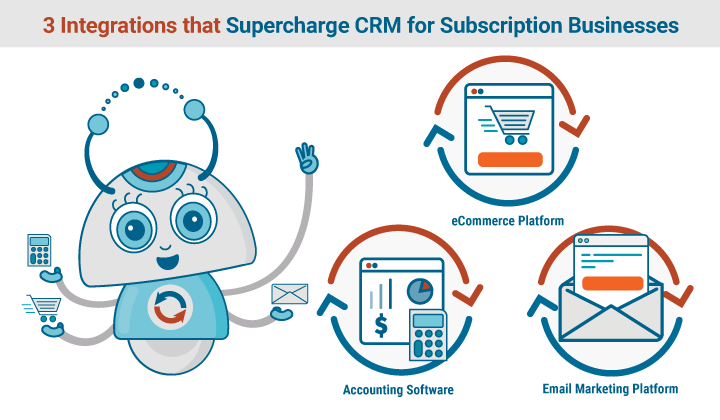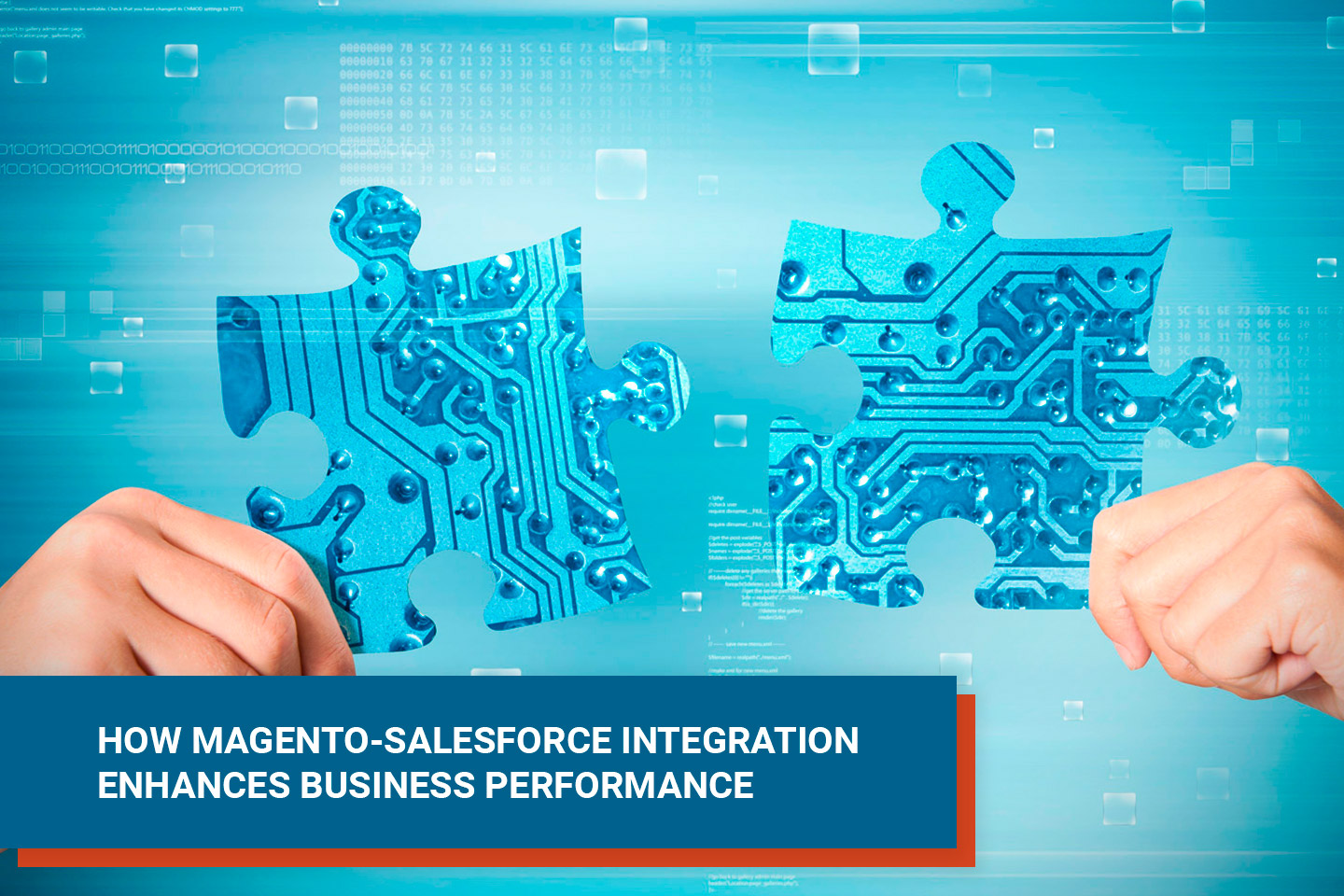3 Integrations that Supercharge CRM for Subscription Businesses
 Igor Krasnykh
·
4 minute read
Igor Krasnykh
·
4 minute read

If you're taking advantage of CRM and have already incorporated a recurring business model into your operations — which we highly recommend — integrations are absolutely crucial. Recurring revenue businesses require not only subscription business software but also the assistance of CRMs to guide the customer journey effectively.
Moreover, your eCommerce venture necessitates a robust CRM strategy that includes efficient integrations, allowing different platforms to communicate seamlessly with each other, even if they were not initially designed to do so.
Within this blog post, we delve into various typical scenarios where CRM for subscription business and integration are vital and highlight the ideal combinations of solutions that work harmoniously together.
If you want to speak in detail about which solutions would be best for your unique situation, schedule a risk-free call with an eCommerce expert at PowerSync.
The Power of CRM for Subscription Businesses
CRM stands for Customer Relationship Management, and the software does exactly what the name implies. CRMs offer:
- Lead management: CRMs allow you to capture the entire customer journey, so you can make quick and informed sales decisions.
- Detailed customer analytics: CRMs give an in-depth look into customer behavior, purchase history and preferences. When equipped with this information, you can send personalized offers to customers and better serve your existing customer base.
- Comprehensive data insights: Through detailed lifecycle data, you can observe customer behavior and trends — which will help you deliver a more personalized and valuable experience.
- Streamlined processes: CRMs automate sales and marketing processes, including lead generation and customer segmentation. This is a big time-saver as it frees up time and effort you can instead spend on more strategic activities.
- Enhanced customer service: Centralized dashboards allows sales teams to view and respond to customer queries in real-time (a best practice in customer experience).
You’re probably wondering, “What’s the best CRM for subscription business needs?”
The Salesforce CRM has led the market for many years. However, we see more and more businesses using Salesforce for all sales activity while also leveraging HubSpot for customer communication and marketing. There are many options available, but we like these two the best. No matter which CRM platform you choose, the technology is designed to help you nurture customer relationships from beginning to end.
Integrations are one consideration to make when selecting a CRM. Be sure to research which platforms your CRM integrates with so that you can maximize its efficiency. Keep reading to learn about powerful CRM integration solutions you should consider (with software examples included).
Integrating Your CRM and eCommerce Platform
Once you’ve landed on the best CRM solution for your business, we recommend integrating it with your eCommerce platform. Connecting these systems eliminates manual duplicated order entry. When a customer’s shipping and payment details are automatically synced, it helps expedite order processing.
In addition, this type of integration centralizes your customer database into a single dashboard. Therefore, you don’t have to waste valuable time hopping between platforms.
Examples of integrations between CRMs and eCommerce platforms
1. Salesforce and Adobe Commerce (Magento) integration from PowerSync
Adobe Commerce and Salesforce are global tech leaders that have become a vital part of many businesses. While there are other integrations on the market that work with both platforms, PowerSync’s solution has built a great reputation. In fact, online chemical trading company Chemdirect ditched another option for PowerSync’s integration once they realized the first option would not accommodate their complex needs.
2. Salesforce and Shopify integration from PowerSync
PowerSync’s integration has three pricing tiers, so you can choose the option that fits your business needs and desired outcomes. It gives you the ability to capture and begin nurturing leads early in the process. Your sales team can also access a 360-degree omnichannel view of the customer journey from a single place. This integration also allows you to quickly engage with customers who abandon their carts, so you can watch your conversion rates grow.
3. Salesforce and HubSpot Integration
HubSpot’s integration offers a powerful bidirectional sync that automatically updates data between Salesforce and HubSpot. It automatically sends important prospect and customer changes between both platforms to ensure data accuracy between both systems. In addition, the integration synchronizes every email open, CTA click and form submission, making the data available at your fingertips.
Contact us if you need help integrating HubSpot with Salesforce.
Integrating Your CRM and Accounting Software
Accurate accounting is essential for every business, especially when you’re dealing with automatic recurring orders. That’s why accounting software for subscription businesses should always be tied to their CRM.
Examples of Integrations Between CRMs and Accounting Software
1. Salesforce and QuickBooks Online
QuickBooks Online is a leading accounting software for subscription businesses. It allows you to track revenue and expenses in a user-friendly platform.
Because Salesforce is a leading CRM, many options have emerged that integrate the two platforms. Integration between these systems reduces duplicated data entry, increases productivity, drives better business insights, and helps you prep for tax season.
If you’re wondering which Salesforce-QuickBooks Online integration is right for you, see the listings on the Salesforce website.
2. HubSpot and QuickBooks Online Integration from HubSpot
HubSpot’s integration with QuickBooks Online offers a convenient accounting solution. With it, you can conveniently create invoices directly from the deal record in HubSpot. You can also view invoice information and see payment events on the deal timeline.
3. Adobe Commerce and QuickBooks Online from PowerSync
While Adobe Commerce (formerly Magento) is not a true CRM, it holds customer data that many businesses leverage similarly. If you are one of those merchants, automate your accounting process with PowerSync’s Magento and QuickBooks integration.
Integrating Your CRM and Email Marketing Platform
When using a CRM for subscription business management, it’s helpful to have an email marketing integration in place.
Examples of Integrations Between CRMs and Email Marketing Platforms
1. Salesforce and HubSpot Marketing Hub
Integrating Salesforce with HubSpot offers fast and reliable syncing between the two systems. HubSpot’s Salesforce integration is designed to help you keep your marketing and sales databases in perfect harmony. With this integration, you can use details from Salesforce to segment your database, personalize marketing emails or even send emails on behalf of a lead’s assigned sales rep.
2. HubSpot CRM and HubSpot Marketing Hub
HubSpot is a diverse brand with a multitude of products, one of which is a CRM. HubSpot’s CRM is deeply integrated with its Marketing Hub solution out of the box, which is one of the reasons why we recommend it. This option requires very little effort to start using both.
3. Salesforce Sales Cloud and Salesforce Marketing Cloud
Like HubSpot, Salesforce offers out-of-the-box connectivity between its CRM and Marketing Cloud products. With it, you can seamlessly unify the two platforms and streamline your email marketing process. Salesforce has a native connector, and there is very simple training available on Salesforce Trailhead explaining how to do it.
Wrapping Up
In eCommerce, choosing the right integrations is just as crucial as selecting the best CRM or subscription business software. However, with so many options on the market, the choices aren’t always clear-cut.
Whether you need assistance with selecting subscription management software for small business needs or enterprise-level solutions, PowerSync is here to help. We invite you to schedule a call with us for risk-free guidance.
What would a 25% boost to your eCommerce sales translate to for your business?
With over 12 years of experience, PowerSync has earned the trust of 100+ customers across 19 countries around the world. They have helped businesses from $3MM to $2.4B in annual revenue to improve their eCommerce ecosystems, and CRM processes, automate bottlenecks, and scale profits.



